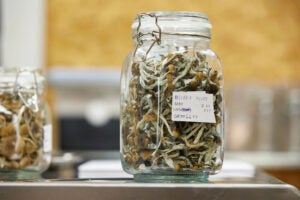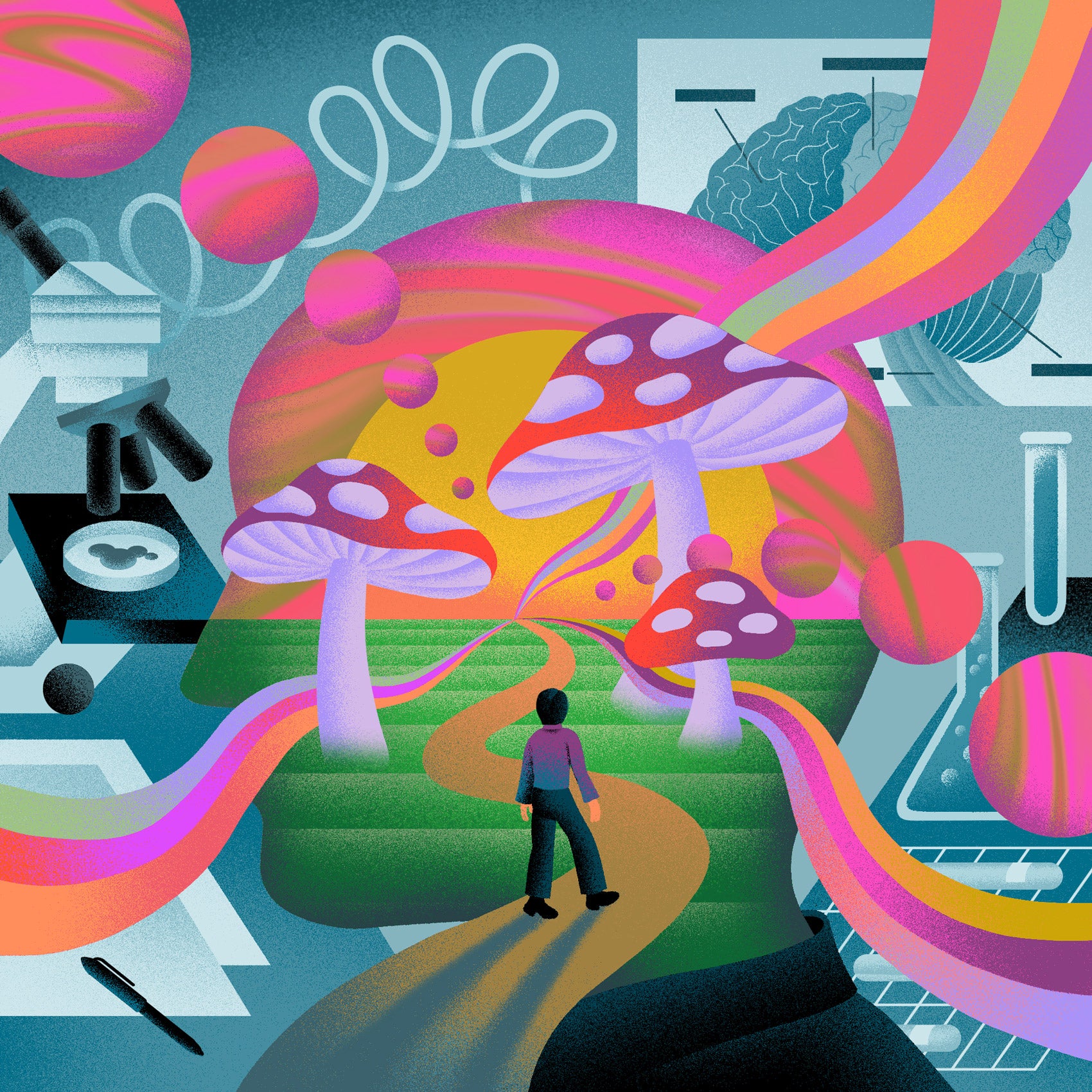People
Mason Marks
-
How to untangle ethics of psychedelics for therapeutic care
April 24, 2024
There’s a telling paradox emerging in the world of treatment with psychedelics, according to Christine Hauskeller. In the past, doctors would be concerned if patients…
-
Research continues to progress on the potential mental and physical health benefits of psychedelics used in a therapeutic context. Yet psychedelic substances remain illegal around…
-
Why regulators may toss cold water on buzz over psychedelics
January 26, 2024
Psychedelic drugs show promise as a new treatment option for some psychiatric maladies, but experts see a possible state and federal legal clash.
-
FDA to review MDMA-assisted therapy, a milestone for psychedelics
December 13, 2023
MAPS Public Benefit Corp. filed an application on Tuesday with the U.S. Food and Drug Administration to approve the psychedelic drug MDMA — also known…
-
Inside the movement to legalize magic mushrooms in Massachusetts
October 26, 2023
On a crisp autumn morning, a pair of hikers bounded through a tangle of oak trees before dropping their backpacks near the banks of a…
-
Psychedelic Therapy Is Here. Just Don’t Call It Therapy
June 15, 2023
From the breathless media coverage, it would appear that Oregon is on the brink of becoming a haven for shroom-fueled mental wellness. Oregon’s Measure 109,…
-
Why are people turning to psychedelics like ayahuasca?
February 6, 2023
Ayahuasca is a psychedelic tea whose roots go back hundreds of years to ceremonial use by Indigenous groups in the Amazon region. …But it’s unclear…
-
Why are people turning to psychedelics like ayahuasca?
February 2, 2023
Ayahuasca is a psychedelic tea whose roots go back hundreds of years to ceremonial use by Indigenous groups in the Amazon region. It’s widely used…
-
Ketamine clinics go beyond therapy
April 4, 2022
The decor of the Nushama Psychedelic Wellness Clinic was designed to look like bliss. "It doesn't feel like a hospital or a clinic, but more like a journey," said Jay Godfrey, the former fashion designer who co-founded the space with Richard Meloff, a lawyer turned cannabis entrepreneur. The "journey", in this instance, is brought on by ketamine, administered intravenously, as a treatment for mental health disorders, albeit one that has not yet been approved by the Food and Drug Administration (FDA). ... "There's nothing suspicious" about off-label prescription use in general, said Mason Marks, a senior fellow at Harvard Law School specialising in the regulations around psychedelics, but ketamine providers need to be careful about over-promising the drug's benefits, particularly when there's limited evidence of its efficacy.
-
What’s in a Name? Psychedelics IP Discussion Heats Up
March 15, 2022
As the psychedelics industry continues to pursue a pharmaceutical business model, the conversation surrounding intellectual property is gaining traction. The business of psychedelic drugs has gained a serious air of legitimacy by modeling itself after the pharmaceutical market. But with this benchmark comes the question of how the industry will marry its goodwill intentions with the hard-nosed business of intellectual property (IP). ... Mason Marks, a senior fellow and project lead with the Project on Psychedelics Law and Regulation at Harvard Law School, said in order to patent a psychedelic substance there needs to be genetic manipulation so that there is a new aspect to the actual substance. “Whether or not you modify the mushroom, you could also patent various methods of growing it and utilizing it, because in those instances, you aren’t patenting the product of nature itself, but a method of producing or using it,” he explained.
-
The décor of the Nushama Psychedelic Wellness Clinic was designed to look like bliss. “It doesn’t feel like a hospital or a clinic, but more like a journey,” said Jay Godfrey, the former fashion designer who co-founded the space with Richard Meloff, a lawyer turned cannabis entrepreneur. The “journey,” in this instance, is brought on by ketamine, administered intravenously, as a treatment for mental health disorders, albeit one that has not yet been approved by the Food and Drug Administration. ... “There’s nothing suspicious” about off-label prescription use in general, said Mason Marks, a senior fellow at Harvard Law School specializing in the regulations around psychedelics, but ketamine providers need to be careful about over-promising the drug’s benefits, particularly when there’s limited evidence of its efficacy. According to Dr. Dan Iosifescu, a psychiatrist at N.Y.U. Langone, ketamine is also potentially addictive, heightening the risk of using the drug, even in a therapeutic setting.
-
Oregon proposes only using one type of mushroom for new psilocybin system, and no pills
February 8, 2022
Oregon would only allow the use of one mushroom species in its new psilocybin system and would ban chemically synthesized psilocybin. These are just two details in a release of new draft rules expected Tuesday from the Oregon Health Authority. The rules, crafted by an advisory board of doctors and other public health experts, will be used to create Oregon’s ground-breaking system for allowing the use of psilocybin, the hallucinogenic substance produced by many mushrooms. ... “It is kind of a landmark moment because Oregon is the very first state to have created such a system of regulation,” said Mason Marks, a member of Oregon’s psilocybin advisory board and a senior fellow on the Project on Psychedelics Law and Regulation at Harvard Law School. “These are the very first draft rules that we’re seeing, so it really is a kind of pivotal event.”
-
A Niche Market Mushrooms
February 7, 2022
Psychedelic mushrooms were touted as a panacea for Oregon’s mental health crisis in 2020, when voters passed a first-in-the-nation measure legalizing the supervised use of psilocybin in state-regulated settings. Backed by Portland-area therapists Tom and Sheri Eckert, the language of Measure 109 promised to improve the physical, mental and social well-being of Oregonians by teaching people about “the safety and efficacy of psilocybin in treating mental health conditions.” ... Psilocybin will mostly be administered instead by facilitators who commit to a 120-hour state-certified training program and apply for a state license. They’ll be trained in the “physical, psychological, and spiritual effects of psilocybin, along with education on ethics, equity, history, and culture,” writes Mason Marks, a law professor in Portland who leads the Project on Psychedelics Law and Regulation at Harvard Law School, and who also sits on the Oregon Psilocybin Advisory Board.
-
Reassessing Psychedelics
January 31, 2022
A new Harvard Law initiative examines the legal and ethical aspects of therapeutic psychedelics
-
Oregon Voters Legalized Psilocybin Use. But What About Microdosing?
January 26, 2022
As some of the experts chosen to usher Oregon into the age of psilocybin mushroom therapy sat down last week for a Zoom meeting, two of them had a bone to pick. At issue: whether the Oregon Psilocybin Advisory Board would get to hear from the “Godfather of Microdosing” this week. ... The exchange took place between two academic heavy hitters, both appointed by Gov. Kate Brown to the psilocybin board. Dr. Atheir Abbas is an assistant professor of behavioral neuroscience at the Oregon Health & Science University School of Medicine, while Dr. Mason Marks is an assistant professor at the University of New Hampshire School of Law and a senior fellow at Harvard Law School’s Project on Psychedelics Law and Regulation.
-
Seattle Legalizes Psychedelics
January 25, 2022
Proponents of the legalization of psychedelics has won a victory. Seattle’s City Council approved a resolution Monday to decriminalize a wide range of activities around psychedelic drugs, including the cultivation and sharing of psilocybin mushrooms, ayahuasca, ibogaine and non-peyote-derived mescaline. The landmark measure extends what is already Seattle city policy not to arrest or prosecute people for personal drug possession to further protect the cultivation and sharing of psychedelic plants and fungi for “religious, spiritual, healing, or personal growth practices.” ... Enacted, the Psilocybin Wellness and Opportunity Act would allow individuals to consume products containing psilocybin and psilocin, the two main active ingredients in psychedelic mushrooms, under the support of a trained and state-licensed psilocybin service administrator. Mason Marks, a senior fellow and project lead on the Project at Psychedelics Law and Regulation at Harvard Law School who helped to draft some sections of the bill, told Marijuana Moment that it “builds on the momentum of previous psilocybin policy reform efforts in Seattle and across the country.” Voters in neighboring Oregon passed an initiative in 2020.
-
‘Moving Beyond the Counterculture of the ’60s’: Why Some Law Firms See Promise in Psychedelics
November 30, 2021
Last Tuesday, a pharmaceutical company traded on the New York Stock Exchange announced a grant to Manhattan’s prestigious Lenox Hill Hospital to launch a new psychotherapy treatment clinic focused on serving marginalized and underserved communities. ... Apart from FDA-approved medications, which present the prospect of a multibillion-dollar industry by the end of the this decade, Oregon is poised to become the first state to open recreational markets in 2022 for mushrooms containing psilocybin. “People are starting to figure out what they need to do to go to Oregon and set up shop,” said Mason Marks, an attorney with Harris Bricken in Portland who also leads the Project on Psychedelics Law and Regulation at Harvard Law School’s Petrie-Flom Center for Health Law Policy, Biotechnology, and Bioethics.
-
Latest psilocybin patent highlights the swirling battle over psychedelics intellectual property
October 26, 2021
One of the leading companies racing to develop psychedelics as legal medicines was granted a patent last week for a formulation of psilocybin — the hallucinogenic compound found in magic mushrooms — a decision that highlights the increasingly intense battle around intellectual property for potential medicines in this rapidly growing sector. This is Compass Pathways’ fourth U.S. patent, but its first for a form of psilocybin the company isn’t using in its clinical trials on treatment-resistant depression. The patent works to “expand their intellectual property kingdom,” said Mason Marks, senior fellow and project lead on the Project on Psychedelics Law and Regulation at Harvard Law School: “Like a landlord would want to expand and buy more properties, they’re trying to lock up as much IP as they can to solidify their position in the market.”


